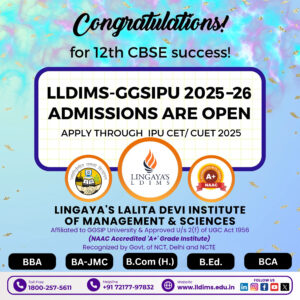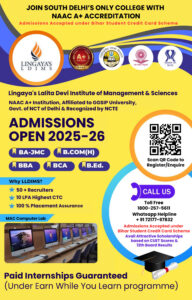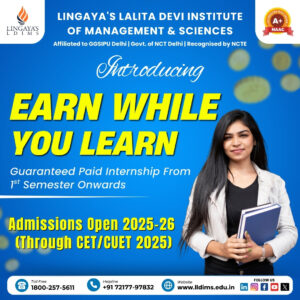Diploma in Pre-School Education
- 2 Years / Onsite
- Intake: Jul / 50 students
Overview
DPSE is a two-year diploma course affiliated with SCERT(DELHI) and recognized by NCTE. DPSE is a professional programme. Candidates selected for admission must take the programme with years of rigorous educational experience with a commitment to become a teacher.
The minimum eligibility for the DPSE course is grade 12th with at least 50 percent aggregate. The age limit is 17 yrs to 24 yrs. Only Female candidates can enroll. We have a total number of 50 seats in this course.
Students are given exposure & experience in the area of research and experimentation for improving classroom pedagogy, teaching-learning, curricula development and community involvement in school education and publications. LLDIMS offers curricular content of equivalent quality and engages in similar functions. We have a unique history of development that has generated unique resources. Engaging in the activities of the LLDIMS is a rich experience that can be fully appreciated in later years of professional advancement. Through all this, we at LLDIMS are working to empower teachers who will ensure that every child in our nation shall receive learning that helps them to be happy, responsible, healthy and productive citizens.
Career Opportunities
Program Learning Outcomes
The Course consists of theory and practical work in the institute, schools and the community. A variety of activities undertaken in LLDIMS, such as morning assembly, sports and cultural programmes, debates, work experience, art and craft work etc., offer the students to experience a reflection of life in schools.
The curriculum of a Diploma of ECEC program usually covers a range of topics related to early childhood education, including:
- Child development: Understanding how children grow, learn, and develop in the early years is essential to working in early childhood education.
- Curriculum planning and implementation: Students learn to create developmentally appropriate activities and environments for young children.
- Observation and assessment: Students learn how to observe and assess young children to understand their developmental needs and plan effective instruction.
- Health, safety, and nutrition: Students learn how to create safe and healthy learning environments for young children, including knowledge of food safety, sanitation and first aid.
- Building relationships with families: Students learn how to work effectively with families, including communication and partnering with them.
- Legislation and regulations: Students also learn about the laws and regulations that govern early childhood education
In addition to classroom instruction, students in a Diploma program will also complete practical experiences, such as supervised work placement in a preschool, kindergarten or a child care center, where they can apply the knowledge and skills learned in the classroom in a real-world setting. Upon graduation, students are typically eligible to apply for entry-level positions in early childhood education settings, such as assistant teacher, or can use the diploma as a stepping stone for further education and career advancement.
Programme syllabus
Faculty

Dr.Jyoti Dhaiya
Head of Department of Education

Mr. Masroor Hasan
Assistant Professor



